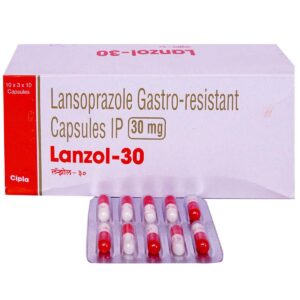LANSOPRAZOLE
LANSOPRAZOLE: Lansoprazole is a proton pump inhibitor that is used to treat conditions such as gastroesophageal reflux disease (GERD), stomach ulcers, and certain types of stomach infections caused by the bacterium Helicobacter pylori.
The mechanism of action of lansoprazole involves blocking the enzyme in the stomach wall that produces acid. By reducing the production of acid in the stomach, it helps to provide relief from symptoms and promote healing of the affected areas.
Lansoprazole is taken orally in the form of capsules and should be swallowed whole, without crushing or chewing. It is typically taken once a day, either with or without food, depending on the specific instructions given by the healthcare provider.
The recommended dose of lansoprazole depends on the condition being treated. For GERD, the usual dose is 15-30 mg once daily for up to 8 weeks. For stomach ulcers, the usual dose is 15 mg once daily for up to 8 weeks. For H. pylori infections, it is usually taken in combination with other antibiotics for a specific duration, as prescribed by the doctor.
Common side effects of lansoprazole may include headache, diarrhea, abdominal pain, nausea, and dizziness. In rare cases, it can cause more serious side effects such as severe allergic reactions, liver problems, and bone fractures.
It’s important to note that lansoprazole may interact with other medications, so it is essential to inform the healthcare provider about all other medications being taken to avoid any potential drug interactions.
Overall, lansoprazole is an effective medication for the treatment of conditions related to excess stomach acid and is generally well-tolerated when taken as prescribed. However, it is crucial to follow the recommended dosage and consult a doctor if any concerning side effects occur.

